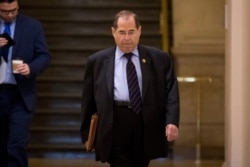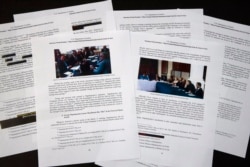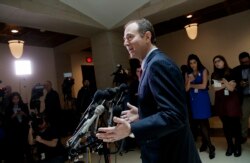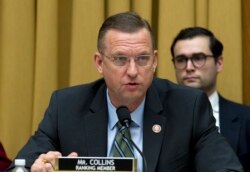This story was last updated on July 23 at 8:45 am.
As former special counsel Robert Mueller prepares to testify before the House Judiciary and Intelligence committees on Wednesday, one thing appears certain: the veteran prosecutor and former FBI director won't reveal anything that's not in his final report to Attorney General William Barr.
"The report is my testimony," Mueller declared on May 29 at the Justice Department.
The Justice Department on Monday sent Mueller a letter emphasizing that he “must remain within the boundaries” of the public version of his report and could not “discuss the conduct of uncharged third parties.”
But Democratic and Republican members of the two panels say that won't stop them from peppering Mueller with tough questions to extract additional information and insights. As for millions of Americans tuning in who've never read the special counsel's 448-page report, they'll be learning directly from Mueller troubling details of how Russia sought to influence the outcome of the 2016 election in favor of candidate Donald Trump and how as president, Trump made repeated efforts to interfere with the investigation.
Democrat Jerrold Nadler, the chairman of the House Judiciary Committee, told CNN Tuesday that Mueller “does not have to comply with that letter.”
“He doesn’t work for them [the Justice Department] and that letter asks for things that are beyond the power of the agency to ask, even if he still worked for them,” Nadler said.
As political frenzy builds over one of the most highly anticipated congressional hearings in recent memory, we provide a reminder of the key findings of the report and speculate on how members of Congress will try to steer the hearing to their advantage.
What the report says:
— Russia interfered in the 2016 U.S. presidential election "in a sweeping and systematic way." This meddling was carried out through two discrete operations. First, Russian military intelligence officers hacked Democratic computers and networks, stealing private information and later releasing it through the anti-secrecy website WikiLeaks with the goal of undermining Democratic presidential nominee Hillary Clinton.Second, a Russian entity called Internet Research Agency orchestrated a targeted social media campaign that "favored candidate Trump and disparaged candidate Clinton."
— There were "numerous" contacts throughout the campaign between Trump campaign officials and individuals tied to the Russian government.These contacts included "business connections, offers of assistance to the campaign, invitations for candidate Trump and (Russian President Vladimir) Putin to meet in person, invitations for campaign officials and representatives of the Russian government to meet, and policy positions seeking improved U.S.-Russian relations."
— While Moscow sought to influence the election and members of the Trump campaign expected to benefit from the information published by WikiLeaks, investigators found little evidence that the campaign "conspired or coordinated" with Russia to change the outcome of the vote.
— As part of their obstruction of justice investigation of Trump, Mueller's team examined a series of 11 actions by the president.These ranged from Trump's firing of former FBI director James Comey in May 2017 to his subsequent efforts to have Mueller dismissed.
— Yet the special counsel left undetermined whether any of these actions constituted a crime. In explaining his decision, Mueller cited a long-standing Justice Department policy that says a sitting president can't be charged with a federal crime. If the president couldn't be indicted, he further explained, it would be "unfair" to recommend charges against him because he could not defend himself while in office. "Charging the president with a crime was therefore not an option we could consider," he wrote.
— While the special counsel exonerated Trump of any criminal conspiracy with Russia, he said he could not do so with regard to obstruction of justice, writing that "if we had confidence he did not commit a crime, we'd have said so."
How the Democrats plan to approach the hearing
With Mueller unlikely to go beyond the report, Democrats who control the House say simply getting the special counsel to read from his report will serve the goal of informing the American public about the findings of an "incriminating" investigation. A recent poll found that just 3% of Americans have read the whole report.
"It's a pretty damning set of facts," House Intelligence Chairman Adam Schiff said on CBS's "Face the Nation" program on Sunday. "Who better to bring them to life than the man who did the investigation himself?"
They also see the hearing as an opportunity to showcase "evidence" that Trump obstructed the investigation. If Mueller is unwilling to venture beyond his findings, they'll simply reference the report by page and paragraph and ask the special counsel to interpret the statement.
"Look at page 344, paragraph two ... does that describe obstruction of justice ... did you find that the president did that, for example?" Nadler said on the "Fox News Sunday" program.
Mueller's answer is likely to disappoint Democrats. Nowhere in his report does he characterize any of Trump's questionable actions as "evidence" of obstruction of justice.
Some Democrats may also attempt to discredit Barr, who, in consultation with other Justice Department officials, determined that Trump had not obstructed justice. The decision infuriated Democrats. At a recent congressional hearing, Barr was asked whether Mueller agreed with his finding. He said he did not know.
What about the Republicans?
Trump's Republican allies in Congress contend that after a 22-month-long investigation, Mueller found nothing incriminating on Trump and that the case should be closed. But they've also made clear they plan to question Mueller over what they say was a flawed investigation with dubious origins.
"Remember, the Mueller report is a one-sided report," Congressman Doug Collins, the top Republican on the House Judiciary Committee said on "Fox News Sunday."
"It has not been questioned from the other side. This is our chance to do that."
Republican supporters of the president have long held that the Mueller investigation was launched on the basis of a largely discredited dossier about Trump's ties to Russia. They've also claimed that the investigation was biased against the president, citing anti-Trump text messages exchanged between two former FBI officials who briefly served on the Mueller team and were romantically involved.













